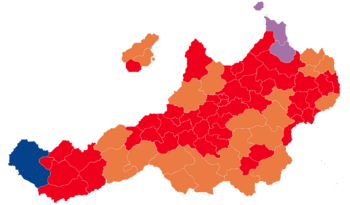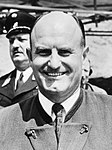1950 Weranian federal election
| |||||||||||||||||||||||||||||||||||||||||||||||||||||||||||||||||||||||||||||||||||||
All 584 seats to the House of Deputies 292 seats are needed for a majority in the House of Deputies | |||||||||||||||||||||||||||||||||||||||||||||||||||||||||||||||||||||||||||||||||||||
|---|---|---|---|---|---|---|---|---|---|---|---|---|---|---|---|---|---|---|---|---|---|---|---|---|---|---|---|---|---|---|---|---|---|---|---|---|---|---|---|---|---|---|---|---|---|---|---|---|---|---|---|---|---|---|---|---|---|---|---|---|---|---|---|---|---|---|---|---|---|---|---|---|---|---|---|---|---|---|---|---|---|---|---|---|---|
| Turnout | 14,805,592 (79.68%) | ||||||||||||||||||||||||||||||||||||||||||||||||||||||||||||||||||||||||||||||||||||
| |||||||||||||||||||||||||||||||||||||||||||||||||||||||||||||||||||||||||||||||||||||
 | |||||||||||||||||||||||||||||||||||||||||||||||||||||||||||||||||||||||||||||||||||||
| |||||||||||||||||||||||||||||||||||||||||||||||||||||||||||||||||||||||||||||||||||||
The 26th federal election was held in the Weranian Confederation for the House of Deputies (the lower house of the Bundestag) on the 16th June 1950. All 584 members of the House of Deputies were elected under a system of proportional representation with each regierungsbezirke treated as an electoral districts. These would be the first elections held following the Valduvian-Weranian War after the expiration of the term of the House of Deputies.
The defeat of Weranian forces in the Valduvian-Weranian War and the failed Colonels putsch had shattered the authority of the right-wing Fatherland Bloc led by the Catholic Social Party which had dominated Weranian politics since the Great Collapse. The dismissal of the government of Franz Rössler, the signing of a peace treaty with Valduvia and the de facto cessation of Western Uschupes and the Zingebirge Basin had led to support for the government to collapse. The left-wing of the KSP split to form the Sotirian Democratic Party which called for a grand coalition committed to economic, social and political reform. They were joined by the Weranic Section of the Workers' International and the Social Democratic Party of Werania which signed the Neuensorg Charter with both parties advocating for an economic system based on Sotirian socialism and entry into the Euclean Community.
The election saw "Tripartite Majority" of the OSAI, SDP and SPO almost assured a majority; the governing right-wing coalition had lost legitimacy due to the war and were both divided and demoralised. Many centrist and centre-right voters moved to support the SDP and SPO to prevent a strong result for the OSAI and ensure any government formed would retain liberal democracy and free-market capitalism. This was to the detriment of the Fatherland Bloc parties which vacillated between a red scare and their own calls for post-war reform.
The election saw the Tripartite Majority gain over three quarters of all parliamentary seats with the OSAI making large gains. Despite identifying as a centre-left party the SDP gained the majority of right-wing voters. Due to mutual differences between the OSAI and SDP the SPO leader, Viktor Beer-Hofmann, became premier. The Fatherland Bloc parties collapsed with the KSP in particular being heavily defeated. The Fatherland Bloc parties never recovered and merged into the Liberal Democratic Party of Werania a year after the election. The Tripariate Majority would rule the country until the 1950 election.
Electoral process
The election was held using a system of proportional repsentation that had been introduced in 1905. The country had 76 electoral districts based on the regierungsbezirke with no electoral threshold. Seat totals were calculated via the greatest divisors method.
Background
Parties
| Affiliation | Party | Ideology | Spitzenkandidat | 1925 result | In government | ||
|---|---|---|---|---|---|---|---|
| Left | 
|
Weranic Section of the Workers' International | Socialism, Revolutionary socialism | Lothar Gotthold | 197 / 584
|
||
| Centre-left | 
|
Social Democratic Party of Werania | Social democracy, Reformism | Viktor Beer-Hofmann | 41 / 584
|
||

|
Radical Party | Radicalism, Anti-clericalism | Konrad Böhm | 26 / 584
|
|||
| Sotirian Democratic Party | Sotirian Democracy, Popularism | Ludwig Stadtbäumer | 0 / 584
|
||||
| Centre-right | 
|
Ruttish Sotirian Democratic Party | Ruttish regionalism, Sotirian Democracy | N/A[a 1] | 13 / 584
|
||
| National Liberal Party | National Liberalism, Classical liberalism | Gottfried von Litzmann | 37 / 584
|
||||
| Right | Centre Party | Agrarianism, Völkisch movement | Egon Horstenau-Ranshofen | 77 / 584
|
|||

|
Catholic Social Party | Political Catholicism, National conservatism | Walther Ritter von Dittmann | 193 / 584
|
|||
Campaign
Results
Aftermath
Outcome
Government formation
- ↑ The SDT did not nominate a spitzenkandidat.





